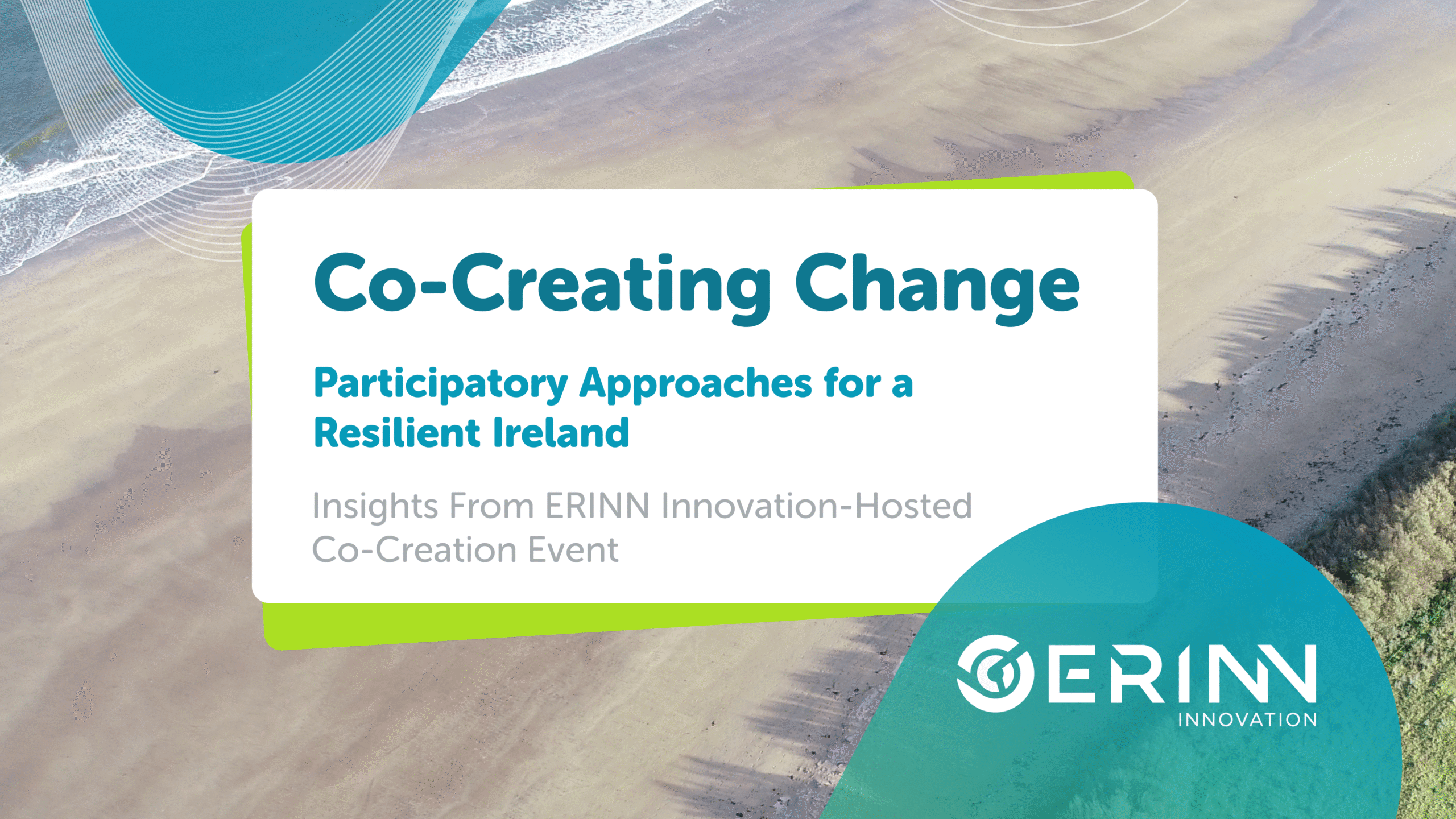Ireland is facing a host of complex, interconnected socioecological challenges. These so-called “wicked problems”, including climate change, biodiversity loss, pollution, and political polarisation, are multi-faceted and require solutions that go beyond traditional top-down approaches. Across the country, co-creation, community-led bottom-up initiatives, and participatory approaches are being embraced more frequently, as practitioners and local actors increasingly see their potential to deliver more adaptive, equitable, and effective responses to these pressing issues.
Co-Creating Change: Participatory Approaches for a Resilient Ireland was an event organised by ERINN Innovation in partnership with EU Projects EmpowerUs, SCORE, and WaterLANDS to act as a timely and action-oriented showcase and discussion space, to bring together practitioners, policymakers, community leaders, researchers, and innovators to explore how participatory approaches can unlock new possibilities for transformative change across Ireland, both in shaping policy and in driving on-the-ground practices.
Through case studies, expert panels and interactive discussions, the event spotlighted how co-creation and participatory processes can be meaningfully implemented as a powerful method for addressing Ireland’s most pressing environmental issues, tackling the climate and biodiversity crises and ensuring a just transition.
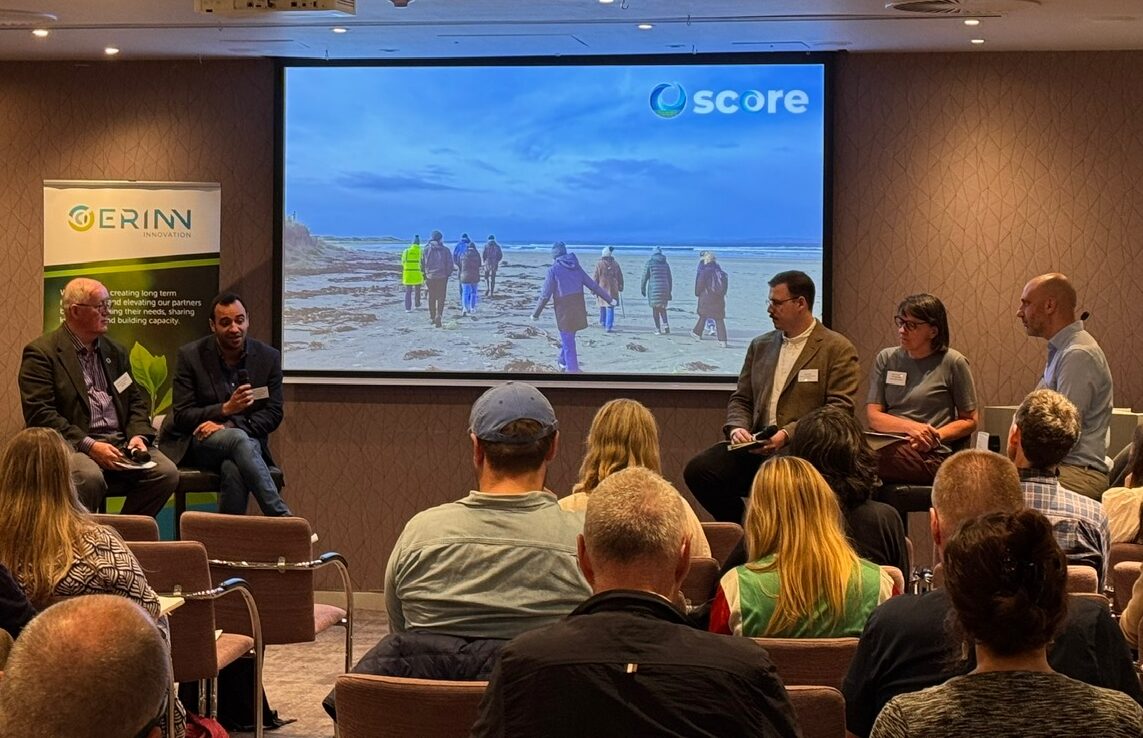
Panel 1: Using Living Labs and Regional Networks to Co-Create Solutions
The first panel discussed the complexities and various implementations of co-creation in addressing significant challenges like climate change and biodiversity loss, with a particular focus on how to move beyond mere “ticking the box” exercises. The panel was facilitated by Michael Papapetrou (Executive Director, ERINN Innovation) and featured contributions from Salem Gharbia (Atlantic Technological University Sligo, SCORE Project), Alex Miller (Queen’s University Belfast, EmpowerUs Project), Sarah Prosser (Bioregioning South East Ireland), and Micheál Ó Cinnéide (Irish Ocean Literacy Network). Each panellist shared experiences from their respective initiatives, exploring what truly works in these processes.
The first panel explored the multifaceted nature of co-creation, from its potential to its challenges, emphasising the importance of clear problem definition, inclusive processes, innovative tools, and sustained engagement to empower communities and achieve tangible, sustainable outcomes.
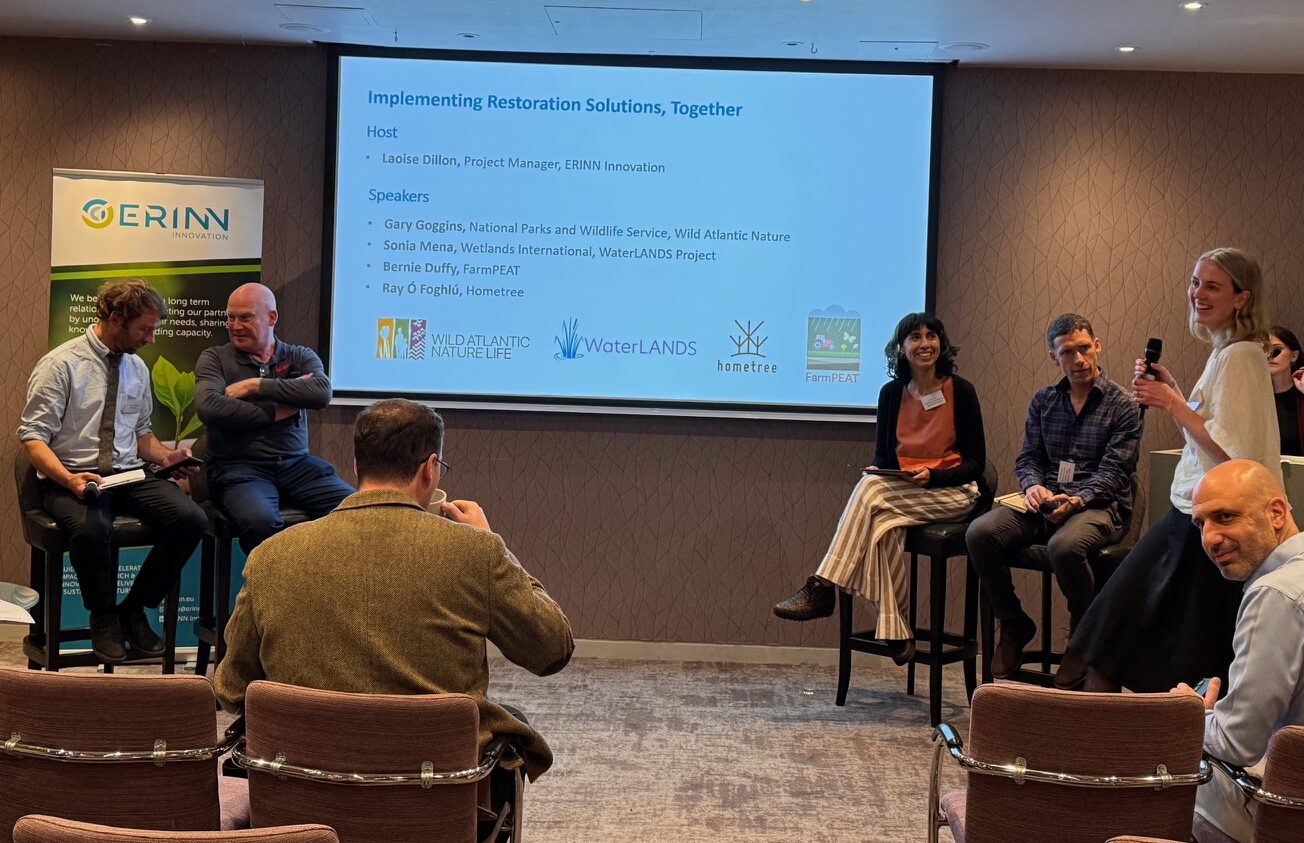
Panel 2: Implementing Restoration Solutions, Together
The second panel of the day focused on the practicalities and challenges of implementing participatory approaches to nature restoration, facilitated by Laoise Dillon (Project Manager, ERINN Innovation) and featuring insights from Gary Goggins (National Parks and Wildlife Service, Wild Atlantic Nature LIFE), Sonia Mena (Wetlands International, WaterLANDS), Bernie Duffy (FarmPEAT), and Ray Ó Foghlú (Hometree).
Each speaker summarised these initiatives and the elements of co-creation that they have integrated into their work. The panel discussion noted that fragmented land ownership is a significant challenge in Ireland, where land is owned by numerous individuals (sometimes hundreds for commonage), making large-scale restoration difficult and expensive. Additionally, there’s a need for policymakers to move beyond solely ecological data in prioritisation and incorporate socio-economic and cultural factors, as farmers often have genuine concerns that need to be addressed.
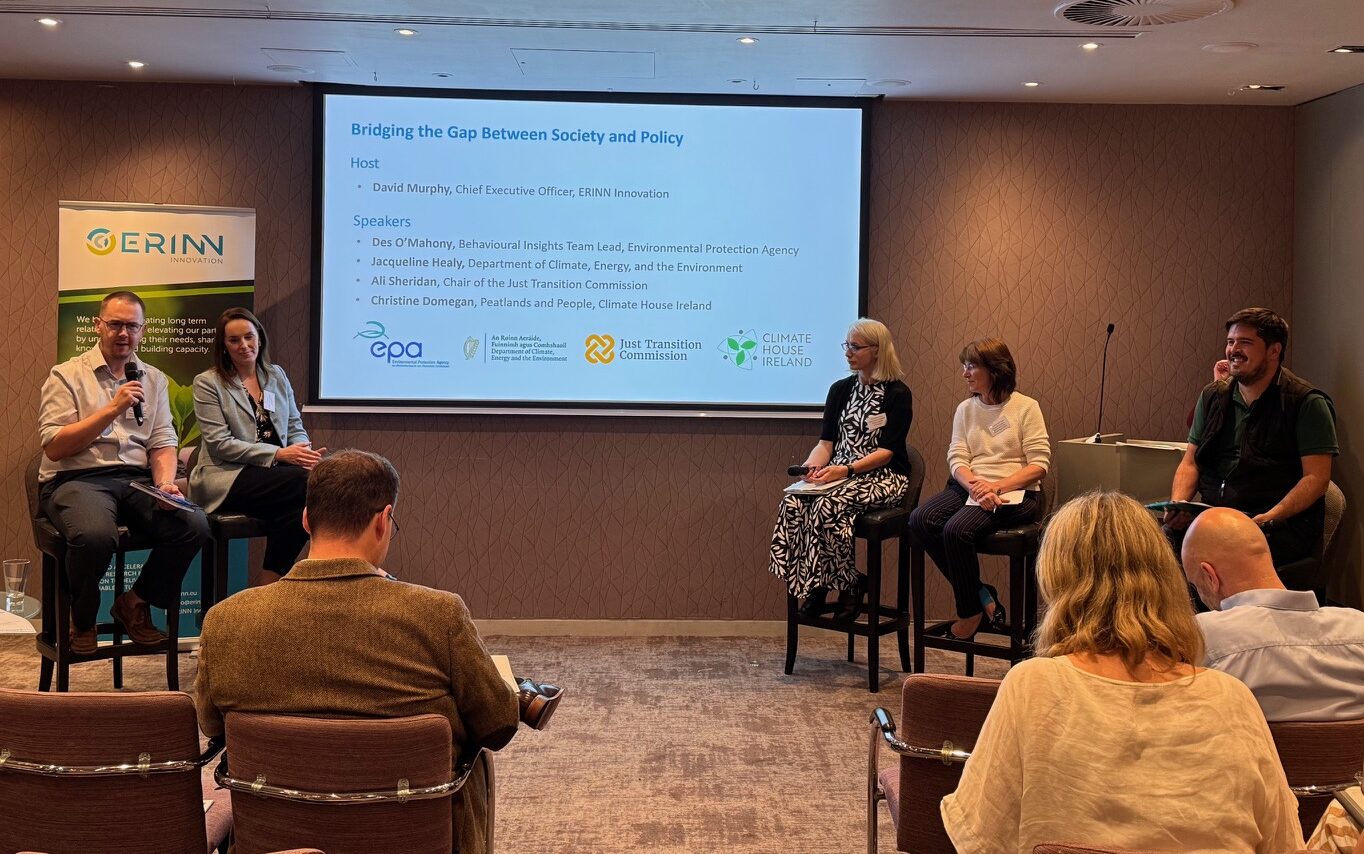
Reflecting on her panel, Laoise Dillon said: “It was amazing to hear from people working to embed community-centric approaches within restoration in Ireland and Europe. A key takeaway for me was that the technical aspects of restoration like blocking drains or planting trees aren’t the main challenge. What’s needed is a stronger focus on social thinking, acceptance, and economic innovation. There’s a clear need to bring people together to achieve this going forward – not just local communities on the ground, but also policymakers, funders, and others involved in the system.”
Panel 3 – Bridging the Gap Between Society and Policy
The final panel examined the role of participatory approaches in shaping policy and driving systemic change, facilitated by David Murphy (Chief Executive Officer, ERINN Innovation) and featuring perspectives from Desmond O’Mahony (Behavioural Insights Team Lead, Environmental Protection Agency), Jacqueline Healy (Department of Climate, Energy, and the Environment – DCEE), Ali Sheridan (Chair of the Just Transition Commission), and Christine Domegan (Peatlands and People Foundation, Climate House Ireland).
An initial discussion focused on the urgency of climate action versus the “slow emergency.” While the need for climate action is urgent, it’s often not perceived as such by the public due to more immediate concerns like bills and jobs, making it a marketing challenge to reframe the narrative. Further, panellists repeatedly emphasised that trust is hard-won and easily lost, especially with short-term projects and inconsistent support. Effective co-creation requires deep, structured engagement and often involves non-traditional methods to include marginalised voices and address inherent power imbalances.
The panel also grappled with how to accelerate policy implementation, balance top-down mandates with bottom-up community needs and manage the complex interdependencies between various sectors (e.g., agriculture, energy, textiles). The importance of understanding social norms and designing interventions based on people’s actual needs and motivations, rather than just what policymakers want, was highlighted through social marketing examples.
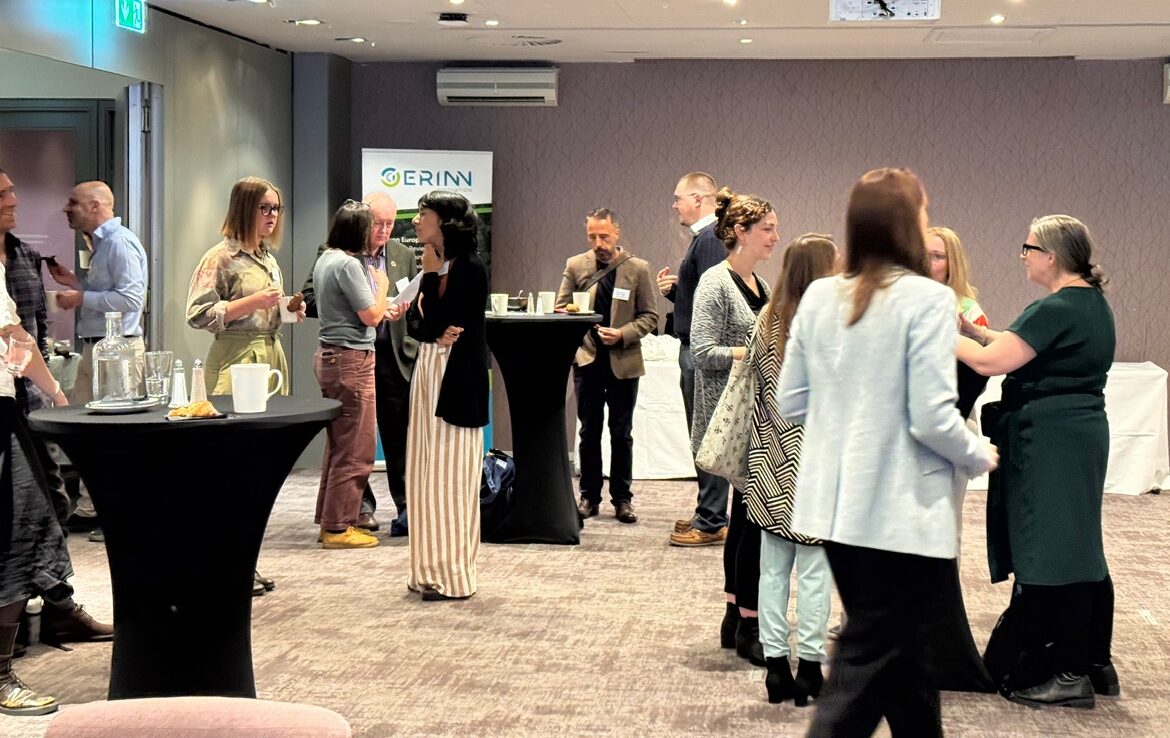
Continuing The Conversation
Following all three panels, an open discussion and Q&A took place. The session focused on several interconnected challenges and opportunities related to co-creation, climate action, and community engagement. Co-Creating Change: Participatory Approaches for a Resilient Ireland highlighted the vital role of participatory approaches in building a more resilient and sustainable Ireland.
Speaking about the event, ERINN Innovation Executive Director Michael Papapetrou said: “At ERINN Innovation, we’re always trying to maximise the impact of our European projects. This event was a good reminder that we should always prioritise the time and resources needed to build trust in the communities where projects are taking place. An important first step in that process is to make sure to establish a common understanding with all necessary stakeholders of the problem that we’re trying to solve.”
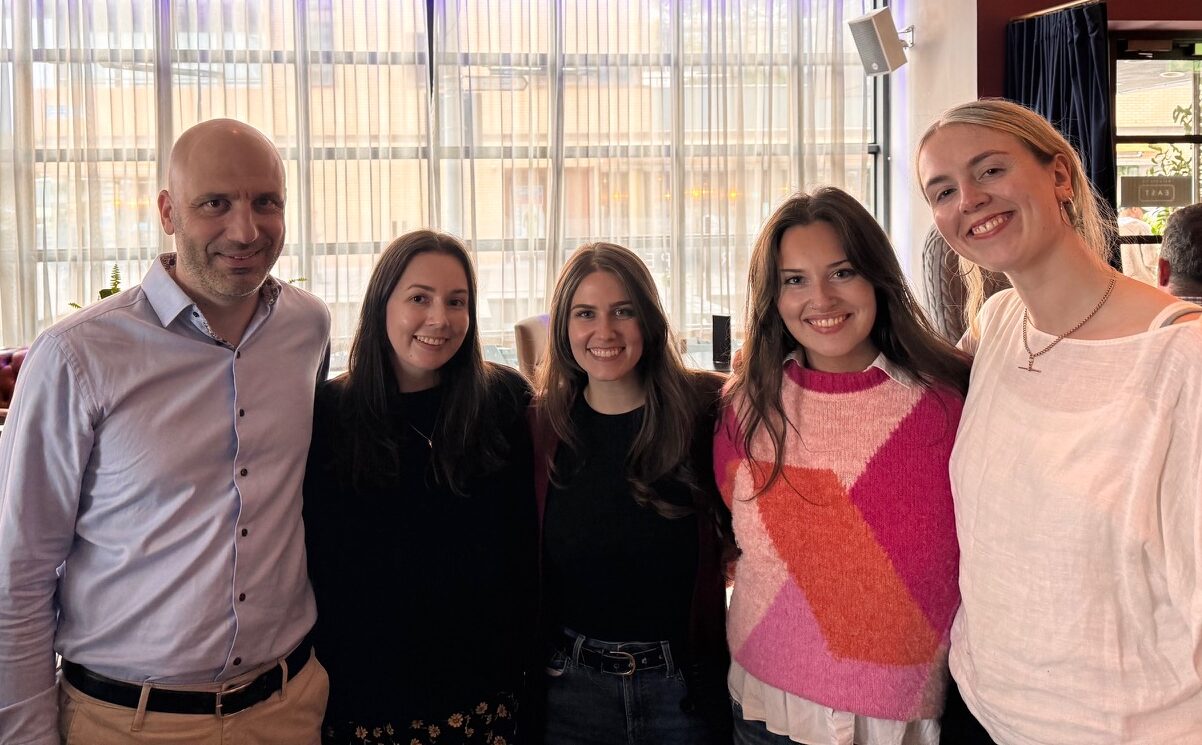
A sincere thank you from ERINN Innovation to all the panellists and attendees who made the event a success. We are looking forward to continuing this work towards a more inclusive, resilient Ireland.
Read the full event report, created in collaboration with all panelists, here.
Visit our Projects Page to explore the different European projects ERINN Innovation is working with.
ERINN Innovation will be continuing these conversations around co-creation at the upcoming Climate Carnival.

